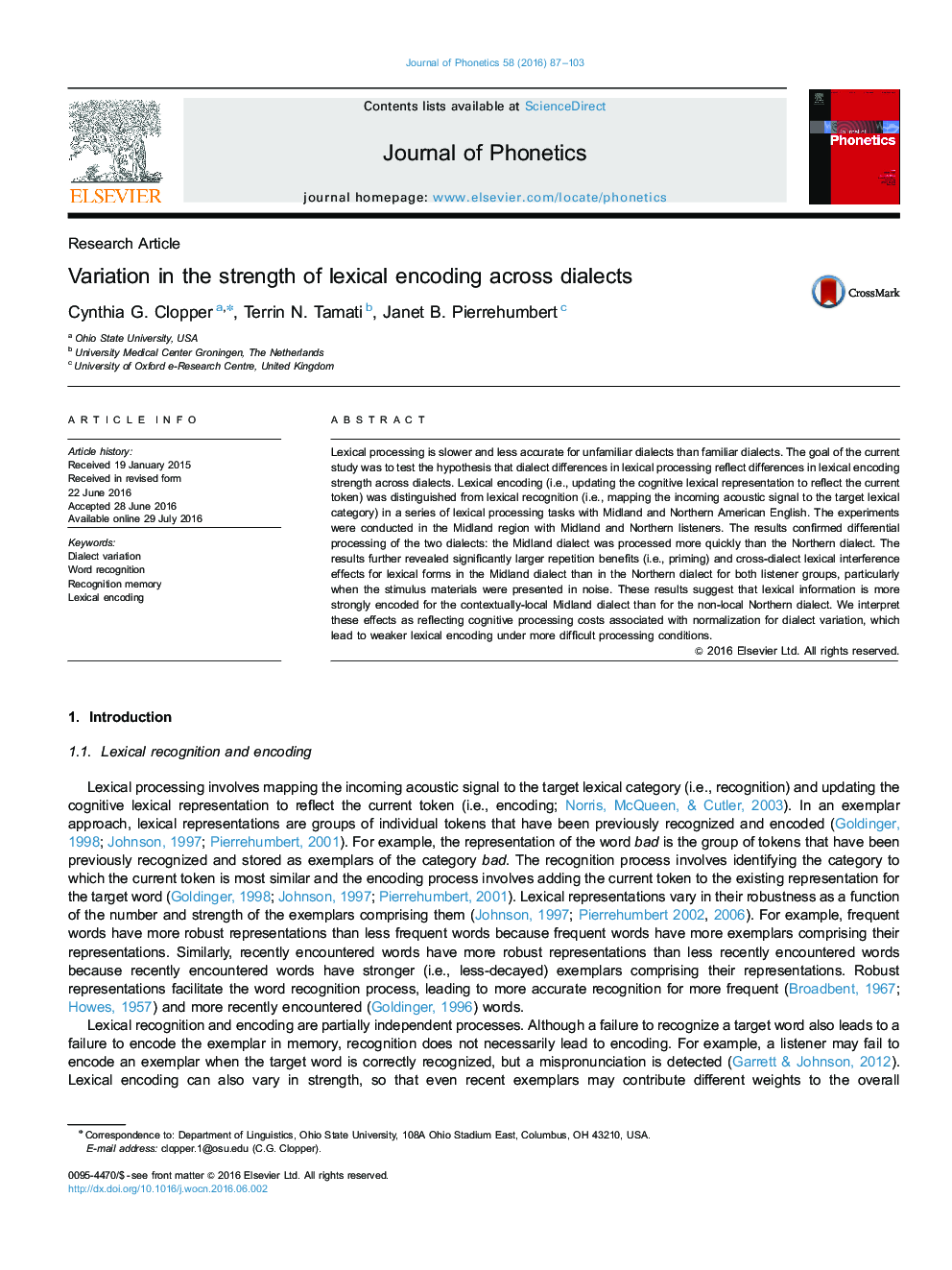| کد مقاله | کد نشریه | سال انتشار | مقاله انگلیسی | نسخه تمام متن |
|---|---|---|---|---|
| 7532799 | 1488097 | 2016 | 17 صفحه PDF | دانلود رایگان |
عنوان انگلیسی مقاله ISI
Variation in the strength of lexical encoding across dialects
ترجمه فارسی عنوان
تنوع در قدرت کدگذاری واژگان در سراسر گویش
دانلود مقاله + سفارش ترجمه
دانلود مقاله ISI انگلیسی
رایگان برای ایرانیان
کلمات کلیدی
تنوع زبانی، به رسمیت شناختن کلمه حافظه تشخیص، کدگذاری واژگانی،
ترجمه چکیده
پردازش لکسیکی برای گویش های نا آشنا کمتر و دقیق تر از گویش های آشنا است. هدف از مطالعه حاضر، آزمون فرضیه است که تفاوت های گفتاری در پردازش واژگان، منعکس کننده تفاوت در قدرت کدگذاری واژنی در سراسر گویش ها است. کدگذاری واژگانی (به عنوان مثال، بهروزرسانی نمایشی شناختی واژگانی برای نشان دادن نشانگر فعلی) از نشانه واژگانی (یعنی نمایش سیگنال صوتی ورودی به رده واژگانی هدف) در یک سری از کارهای پردازش واژنی با میدلند و آمریکای شمالی آمریکایی متمایز بود. این آزمایش ها در منطقه میدلند با شنوندگان میدلند و شمال انجام شد. نتایج حاصل از پردازش دیفرانسیل دو گویش تایید شد: گویش میدلند سریعتر از گویش شمال کار می کرد. نتایج نشان داد که اثرات تداخل واژگان متقابل دیجیتالی به صورت واژگانی در گویش میدلند نسبت به گویش شمالی برای هر دو گروه شنونده، به ویژه زمانی که مواد تحریک در نویز ارائه می شود، بیشتر نشان می دهد. این نتایج نشان می دهد که اطلاعات واژگانی قوی تر برای گویش محلی میدلند به زبان محلی ترجیح داده شده است تا گویش محلی غیر محلی. ما این اثرات را به عنوان بازتاب هزینه های پردازش شناختی مرتبط با نرمال سازی برای تغییرات گفتار، که منجر به رمزگشایی واژگانی ضعیف تحت شرایط سخت تر شدن پردازش می شود، تفسیر می کنیم.
موضوعات مرتبط
علوم انسانی و اجتماعی
علوم انسانی و هنر
زبان و زبان شناسی
چکیده انگلیسی
Lexical processing is slower and less accurate for unfamiliar dialects than familiar dialects. The goal of the current study was to test the hypothesis that dialect differences in lexical processing reflect differences in lexical encoding strength across dialects. Lexical encoding (i.e., updating the cognitive lexical representation to reflect the current token) was distinguished from lexical recognition (i.e., mapping the incoming acoustic signal to the target lexical category) in a series of lexical processing tasks with Midland and Northern American English. The experiments were conducted in the Midland region with Midland and Northern listeners. The results confirmed differential processing of the two dialects: the Midland dialect was processed more quickly than the Northern dialect. The results further revealed significantly larger repetition benefits (i.e., priming) and cross-dialect lexical interference effects for lexical forms in the Midland dialect than in the Northern dialect for both listener groups, particularly when the stimulus materials were presented in noise. These results suggest that lexical information is more strongly encoded for the contextually-local Midland dialect than for the non-local Northern dialect. We interpret these effects as reflecting cognitive processing costs associated with normalization for dialect variation, which lead to weaker lexical encoding under more difficult processing conditions.
ناشر
Database: Elsevier - ScienceDirect (ساینس دایرکت)
Journal: Journal of Phonetics - Volume 58, September 2016, Pages 87-103
Journal: Journal of Phonetics - Volume 58, September 2016, Pages 87-103
نویسندگان
Cynthia G. Clopper, Terrin N. Tamati, Janet B. Pierrehumbert,
